The Walking Dead: The Many Versions of Rick Grimes
We salute the man, the beard, the legend, the many versions of Andrew Lincoln’s The Walking Dead lead, Rick Grimes…
This article comes from Den of Geek UK. It contains spoilers.
We didn’t get a death, so there wasn’t a funeral. Heavily promoted as “Rick Grimes’ last episode,” “What Comes After” felt more like “Rick Grimes’ last episode for the time being, and also, there might be some movies if that all comes off.”
It may not have provided a definitive ending for the character, but it was an emotional farewell rounding off The Walking Dead’s very first story: that of a man trying to find his family. Rick was saved by the people he’d saved and realized that his real family was the friends he’d made along the way. What happens next is only for the gods/AMC executive producers to know.
In lieu of a eulogy, here’s a tribute to Rick Grimes, the man, the hat, the beard, the legend…
Officer Friendly
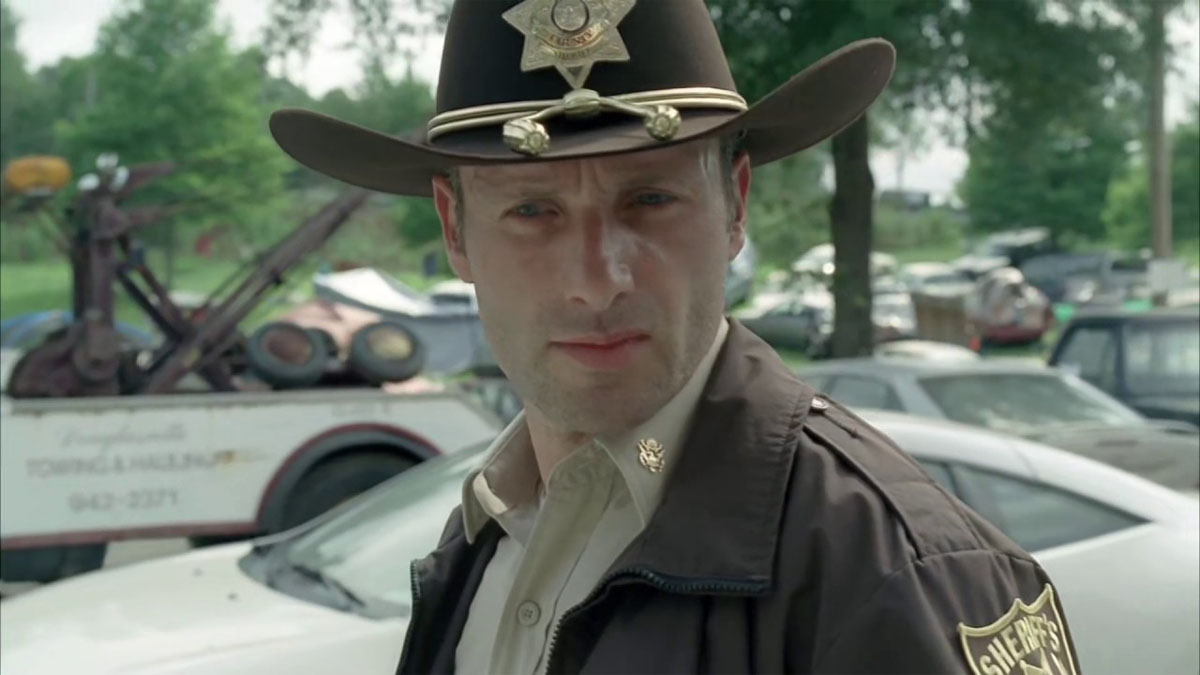
“We don’t kill the living.”
Neat uniform, pristine hat, short back and sides, and barely a five o’ clock shadow… that was season one Rick Grimes, a deputy sheriff in a small town, loving husband and father-of-one. Pre-apocalypse, we met Rick as a devoted officer and a natural leader. While his colleagues were joking around, he reminded them to stay focused on the job. Then he got shot twice, and fell into a coma that made him miss the end of the world.
Further Reading: Why Rick Grimes Will Never Die
Even after the world ended, Officer Friendly, a name he’d sarcastically given to himself, was straight-backed and honorable. He might have been, in Glenn’s words, “a dumbass” with a lot to learn about the undead, but he instinctively knew right from wrong. Rick sided with good people, dealt with racist dipshit Merle Dixon, kept the peace, and told Daryl in no uncertain terms that “we don’t kill the living.”
Er, about that…
The Ricktator
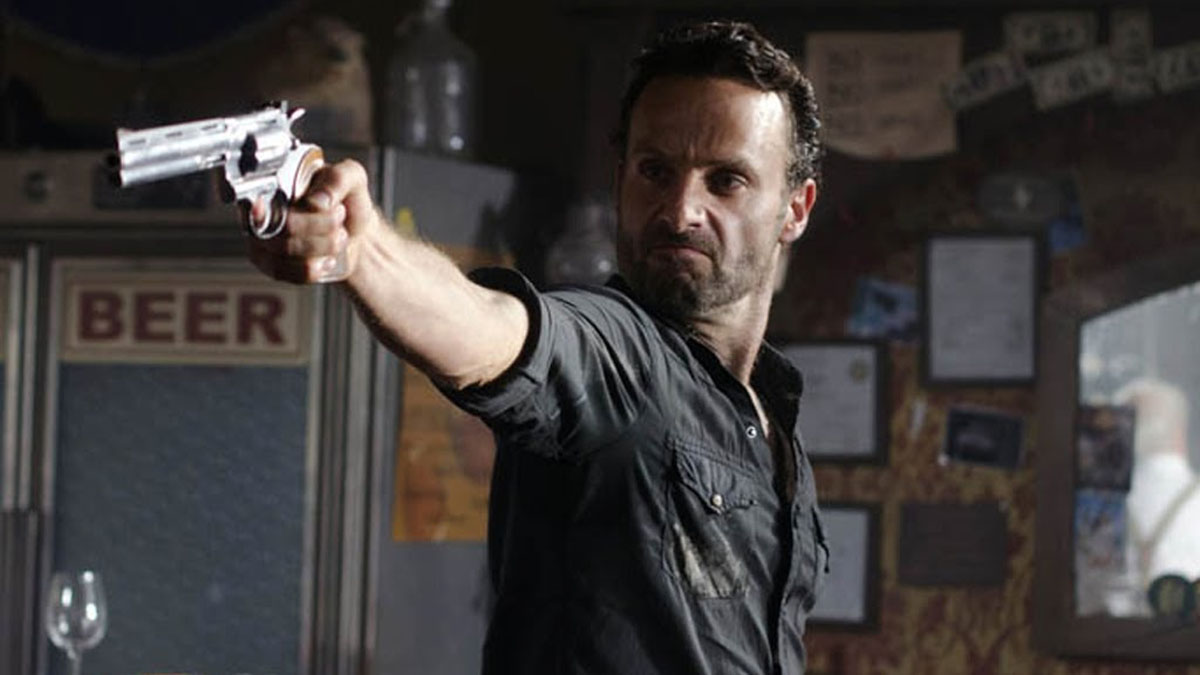
“This isn’t a democracy anymore.”
Rick kills the living. The world hasn’t been gone for long before selfishness and violence rise up over decency and kindness. The groups Rick and company encounter along the way are peopled by the cowardly and the cruel. Two such are Dave and Tony, the men Rick and Hershel encounter in a season two bar, who threaten to track down the farm and take what they want. Faced with the choice between keeping his moral code and protecting his family, Rick chooses the latter, and who could blame him? The apocalypse is no time for moral absolutism.
In season two, reluctant leader Rick learned that uneasy lies the head that wears a gold tasseled hat. His leadership faced mutiny from within, as his best friend and partner Shane schemed to kill him and take his place. He learned that Lori’s baby might not be his, and through it all, struggled to make the right choices and do the hard jobs. For all Shane’s gung-ho approach to the walkers in the barn, it was Rick and not him who put poor Sophia out of her undead misery. It was Rick who gave blood to save Carl’s life and who wrestled with what to do with Randall.
Further Reading: The Walking Dead – Rick Grimes Ending Explained
After all that, Rick’s season two campfire speech makes perfect sense. Those are the words of a man pushed far, far past his limits. He’s mean, he’s sarcastic (“Go on, there’s the door. Send me a postcard. You can do better? Let’s see how far you get.”). He reminds the ungrateful lot exactly what he’s done for them (“I’m keeping this group together, alive. I’ve been doing that all along.”) and finally, he lays down the law: “Get one thing straight. You’re staying? This isn’t a democracy anymore.”
Captain Trips
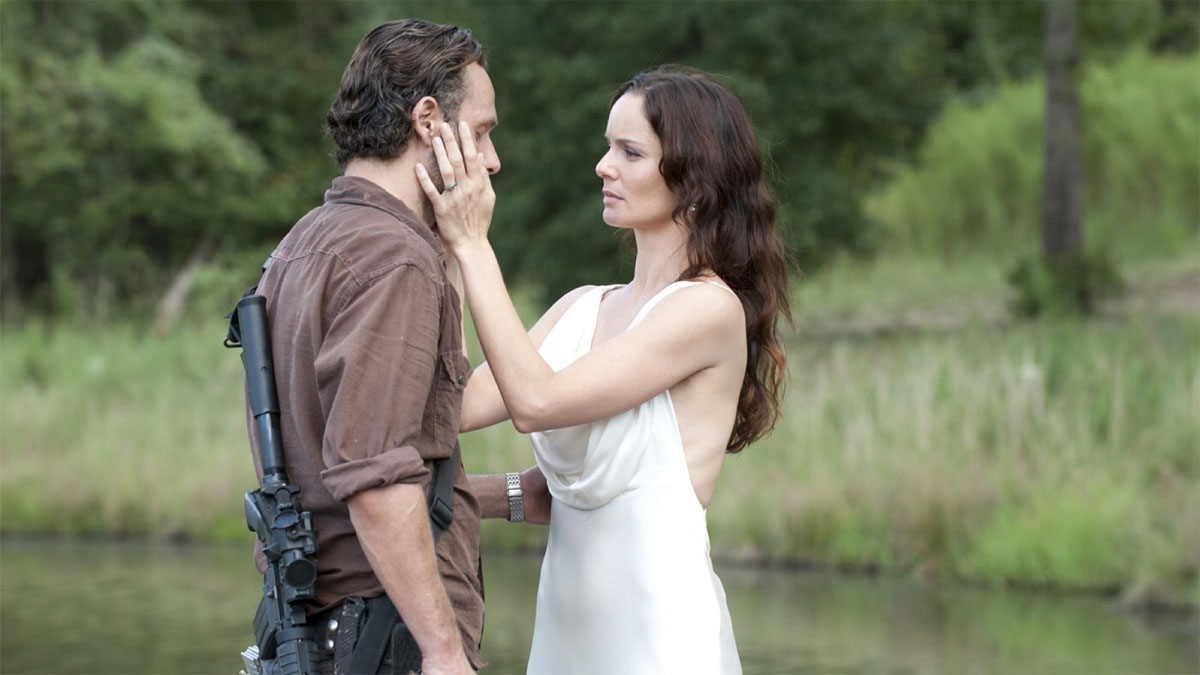
“Everybody’s worried about you.”
After Lori’s traumatic death at the prison, grief sends Rick temporarily out of his mind. The moment he sees that baby in Maggie’s arms and comprehends what it means, his face freezes to a hollow-eyed stare and he loses everything but his rage, turning into a snarling animal. Even Glenn is in danger from this Rick, who throws him against a wall and holds his arm to his throat when he tries to stop him cutting a furious swathe through the prison’s Walker population.
Warming our hearts just a little from the chill of Lori’s gruesome death is how immediately Rick’s brother-in-arms Daryl steps in to help once it’s clear what’s happened. The moment the ground falls out from under Rick’s feet, Daryl is there to start shoveling it back again and prop him up. He gives everybody jobs to do, goes out on a run for baby formula, and swears that the soon-to-be-christened Lil Ass-Kicker, is going to make it. Ah, Daryl.
Further Reading: What Comes After for Rick Grimes
After rage comes instability. Rick doesn’t know what’s real and what’s imagined. He receives four phone calls, one after the other like Scrooge’s ghosts, all from the dead. He pleads with his fantasy callers, “We’re good people here, we just need some help.” That much is clear.
Not Too Far Gone Rick
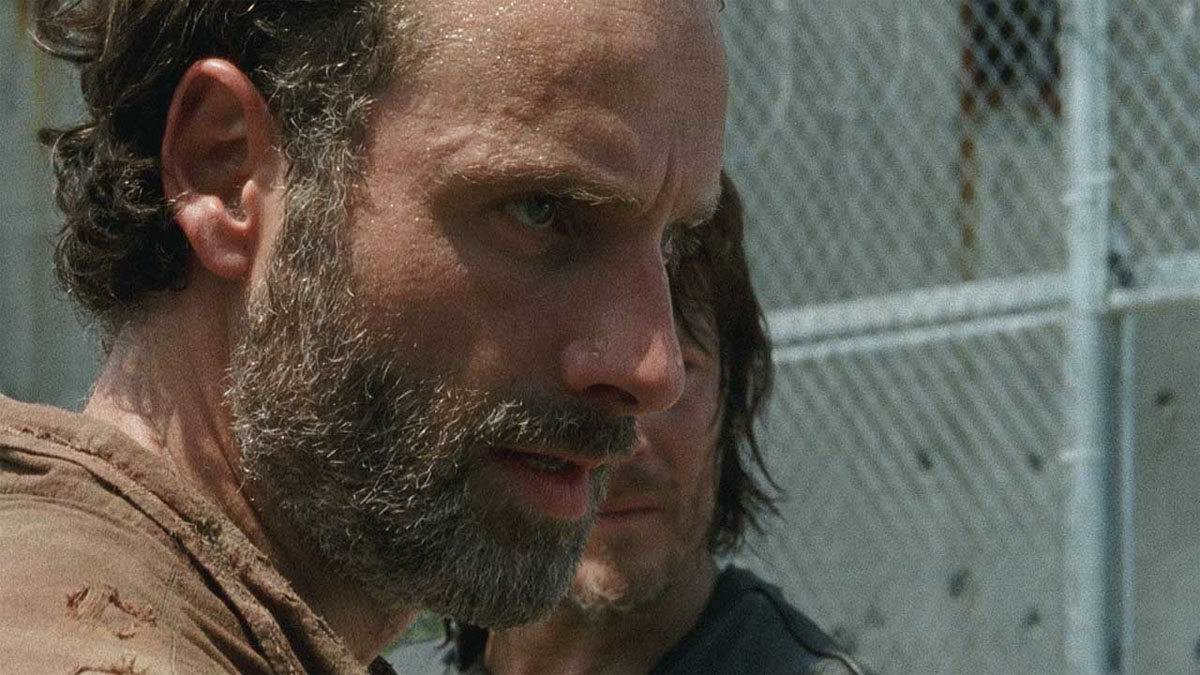
“We can still come back.”
Rick wasn’t the only one unhinged by grief. The Governor, already a despot with dark appetites, went over the edge when Michonne put her katana through his daughter Penny’s skull. Penny was already long dead, of course, having fallen victim to the Walker plague, but her execution made The Governor feel her loss anew. This made him even more dangerous and even more hell-bent on destruction and revenge.
Further Reading: The Walking Dead’s 21 Most Shocking Deaths
By this time, and thanks to the ministrations of Hershel Greene and his gardening metaphors, Rick was healing. He’d healed enough to know that even after so much loss, and so much pain, there was still a chance for a future. This was a new Rick – neither naïve nor bestial, but a Rick who had suffered, and learned, and was desperate for humanity to survive. Things and people weren’t too far gone, he argued. Everybody could walk away from this fight.
The Governor, sadly, didn’t agree, and Hershel paid the price.
Vampire Rick
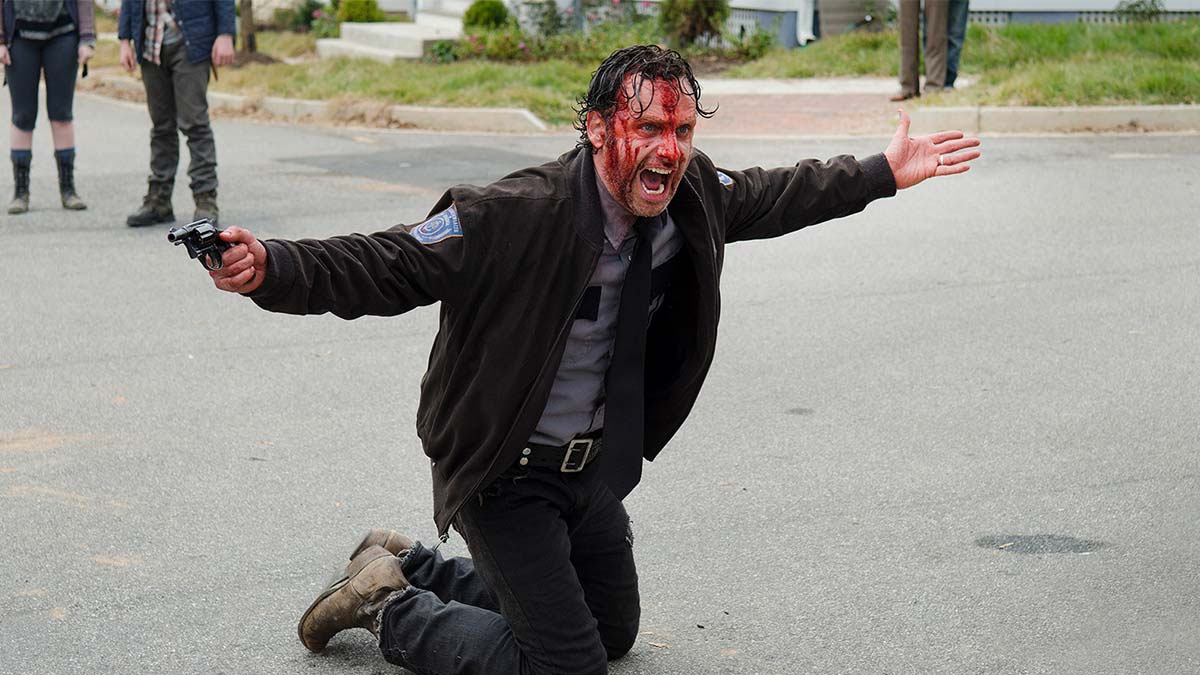
“What the hell are you gonna do now, sport?”
It took eight episodes for “Not Too Far Gone” Rick, who desperately pleaded for peace, to turn into a throat-biting beast that once unleashed, was never quite re-caged. In the season four finale, Rick reached his nadir.
Joe, leader of motorcycle gang The Claimers, came to take revenge on him for killing one of their number in an earlier escape. His men savagely beat Daryl and promised to kill Rick and rape Michonne and Carl. Without any weapons and without any options, Rick took the only path left to him: he lost any pretense of humanity and became an animal. Spotting a second’s opportunity, he lunged at Joe’s neck with his teeth and tore out an artery, then he gutted Carl’s would-be rapist with awful ferocity. The final shot of the scene was Carl, already traumatized, looking at his dad as if he didn’t recognize him.
Further Reading: Andrew Lincoln Plans to Return as Director in The Walking Dead Season 10
Do-anything-to-survive Rick is the one who said (in the uncensored version, anyway) that the Terminus cannibals were “fucking with the wrong people.” He’s the Rick who took a machete to Gareth kneeling in that church and turned him into mush. He’s the blood-soaked Rick who told Deanna in Alexandria “If you don’t fight, you die”, and who executed Pete on her command. He’s the Rick into whose eyes Morgan looked without recognizing the man he’d met in the pilot, all that time ago.
Old Man Rick
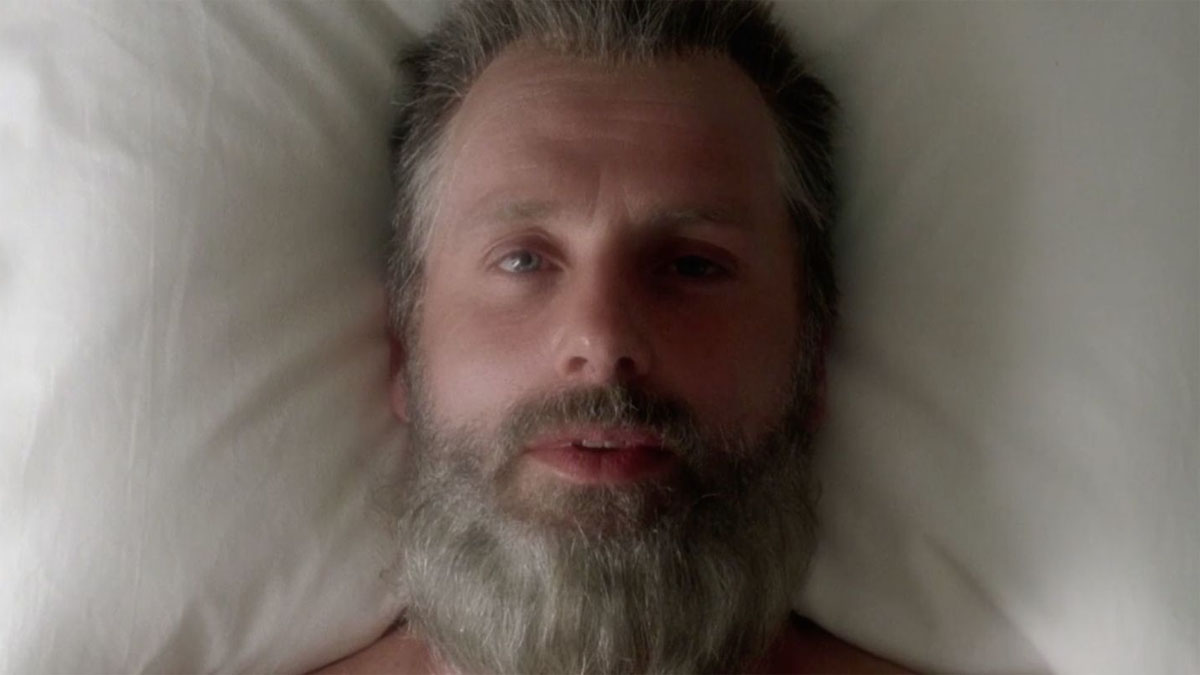
“I’m not afraid of a big owl.”
Does that nasty looking injury mean that Carl’s dream of his dad waking up to Weird Al Yankovic and a world at peace can never be fulfilled? Or will Jadis’ connections heal Rick and allow him to live out this rural idyll?
Further Reading: The False Promises of Telltale’s The Walking Dead
Old Man Rick has a full and manly beard and severely cropped gray hair. He sleeps the sleep of the righteous, wears a dressing gown, walks with a stick, and looks forward to a celebratory festival in his garden community. He lives with his family—Michonne, Carl, and Judith—and it’s a wonderful life.
That was Carl’s dream for his dad. How much of it could still come true?
A New Beginning Rick
“My mercy prevails over my wrath.”
“No matter what happens, it’s human nature to come together” asserted A New Beginning Rick, a statement that hasn’t quite been borne out by the first half of the season in which serious fractures appeared in the relationships between Oceanside, the Saviors, Hilltop, the Kingdom, and everybody else.
Further Reading: A Spoiler-filled Guide to The Whisperers
A New Beginning Rick’s belief in a peaceful future was a lesson learned from Carl. Throughout season eight, we kept seeing Rick catch his reflection in mirrors and contemplate who he was becoming. By its final moment, he’d chosen who he wanted to be: somebody Carl would be proud to call a father. However hard the others made it, A New Beginning Rick stuck to his ideals. “It’s about all of us, together,” he said. “We’re building, we’re growing.” And even now he’s gone, that’s what they’ll do.
Farewell, Andrew Lincoln, whichever Rick you gave us, you did one hell of a job.
